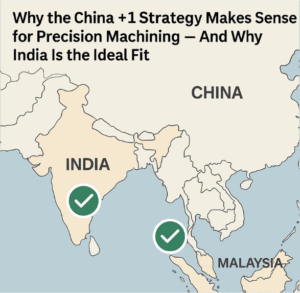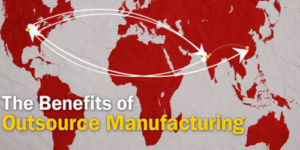In recent years, India has rapidly established itself as a premier destination for sourcing precision CNC machined components. With a robust manufacturing ecosystem, cost-effective operations, a technically skilled workforce, and supportive government policies, India is increasingly the first choice for companies worldwide seeking reliable, high-quality CNC machining solutions.
India’s CNC Machining Strength
India’s manufacturing sector is renowned for its versatility and depth, especially in precision engineering. The country’s CNC machining capabilities span a wide spectrum, from micro-components for medical devices to large, complex parts for aerospace and heavy machinery. Key industries leveraging Indian CNC machining expertise include:
- Automotive: Engine, transmission, and chassis parts with tight tolerances.
- Aerospace: High-precision components made from exotic alloys.
- Industrial Equipment: Custom parts for pumps, valves, and automation systems.
- Medical Devices: Surgical instruments and implants requiring micron-level accuracy.
- Energy: Components for turbines, oil & gas, and renewable energy systems.
Core Capabilities
- Multi-Axis CNC Milling & Turning: Advanced 3, 4, and 5-axis machines capable of producing intricate geometries.
- Complex Assemblies: Integration of machined parts with sub-assemblies, including mechanical and electromechanical systems.
- Advanced Materials: Expertise in machining stainless steel, titanium, aluminum, and engineering plastics.
- Finishing & Inspection: In-house capabilities for surface treatments, heat treatment, and CMM-based inspection to ensure global quality standards.
Why Source CNC Machined Parts from India?
1. Cost Efficiency Without Compromising Quality
Indian CNC shops offer significant cost advantages due to lower labor and overhead costs, yet maintain high standards through investment in modern equipment and process automation. This balance enables competitive pricing for both prototypes and high-volume production.
2. Skilled Engineering Talent
India produces a vast number of engineering graduates annually, many specializing in mechanical and manufacturing engineering. This talent pool is adept at interpreting complex drawings, using advanced CAD/CAM software, and maintaining stringent quality controls.
3. Focus on International Standards
More Indian manufacturers are certified to ISO 9001, IATF 16949 (automotive), and AS9100 (aerospace). Many have adopted lean manufacturing, Six Sigma, and TQM methodologies, ensuring consistent quality and continuous improvement.
4. Government Support
Initiatives like “Make in India” and sector-specific incentives have made it easier for international companies to collaborate with Indian manufacturers. Streamlined regulations and improved ease of doing business attract global buyers seeking long-term partnerships.
5. Strategic Export Location
India’s geographic position enables efficient shipping to Europe, North America, and Asia-Pacific. Major ports and improving logistics infrastructure facilitate timely deliveries and reduce transit costs.
Challenges in Sourcing Precision Machined Parts from India
1. Infrastructure Gaps
While major industrial hubs boast modern facilities, some regions still face challenges with logistics, power supply, or transportation. Choosing suppliers in established clusters can help mitigate these issues.
2. Supplier Qualification
The Indian CNC machining sector includes both world-class exporters and small local shops. Rigorous supplier vetting, audits, and sample approvals are essential to ensure capability and reliability.
3. Quality Consistency
While top-tier suppliers deliver excellent quality, maintaining consistency—especially with new or smaller vendors—may require close monitoring, clear specifications, and regular quality audits.
4. Lead Time Management
Complex parts or high-mix, low-volume orders may have longer lead times due to setup and tooling requirements. Effective project management and transparent communication are key to meeting deadlines.
Strategic Tips for Successful Sourcing
1. Thorough Supplier Evaluation
Assess potential partners for technical expertise, certifications, financial stability, and export experience. Site visits and third-party audits can provide valuable insights.
2. Invest in Relationships
Building strong, long-term relationships with Indian suppliers fosters trust, smoother collaboration, and better responsiveness to changing requirements.
3. Emphasize Process Controls
Work with suppliers who demonstrate robust process controls, in-process inspection, and traceability. Request regular quality reports and encourage continuous improvement initiatives.
4. Diversify Your Supply Chain
While India offers compelling advantages, consider a multi-sourcing strategy to mitigate risks related to geopolitical shifts, logistics disruptions, or unforeseen events.
The Road Ahead
India’s precision CNC machining sector is on an upward trajectory, driven by digital transformation, adoption of Industry 4.0 technologies, and a growing focus on export markets. As global demand for high-quality, competitively priced machined parts continues to rise, India is well-positioned to be a strategic sourcing partner for companies worldwide.
By carefully selecting partners like Spectra, investing in quality management, and leveraging India’s engineering strengths, businesses can unlock significant value and resilience in their global supply chains.
Explore India’s potential for your next precision CNC machining project—and discover why more global manufacturers are making India their trusted sourcing destination.
Interested in exploring India-based machining partnerships?
Contact us today to learn how Spectra Manufacturing LLC can help you fulfill your CNC machining needs with precision, scalability, and global efficiency.
📩 info@spectramfg.com
🌐 www.spectramfg.com

